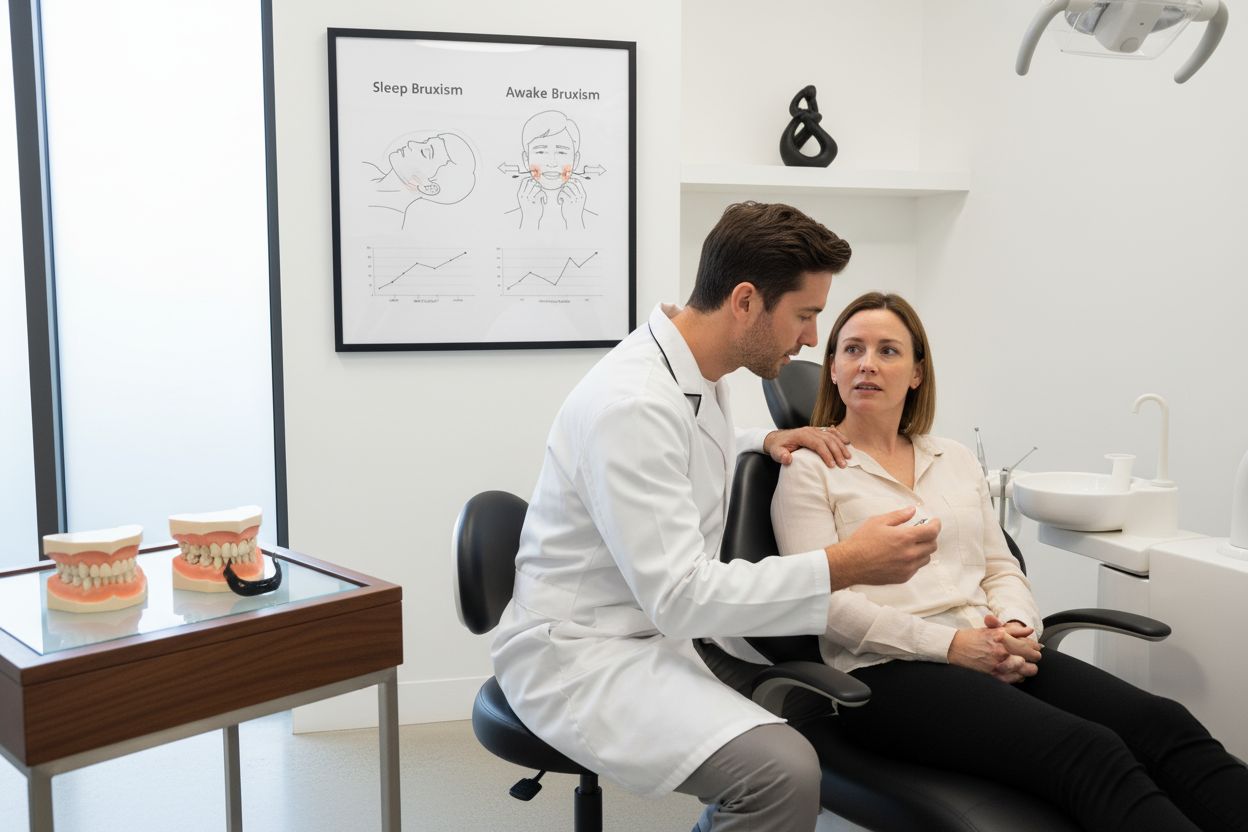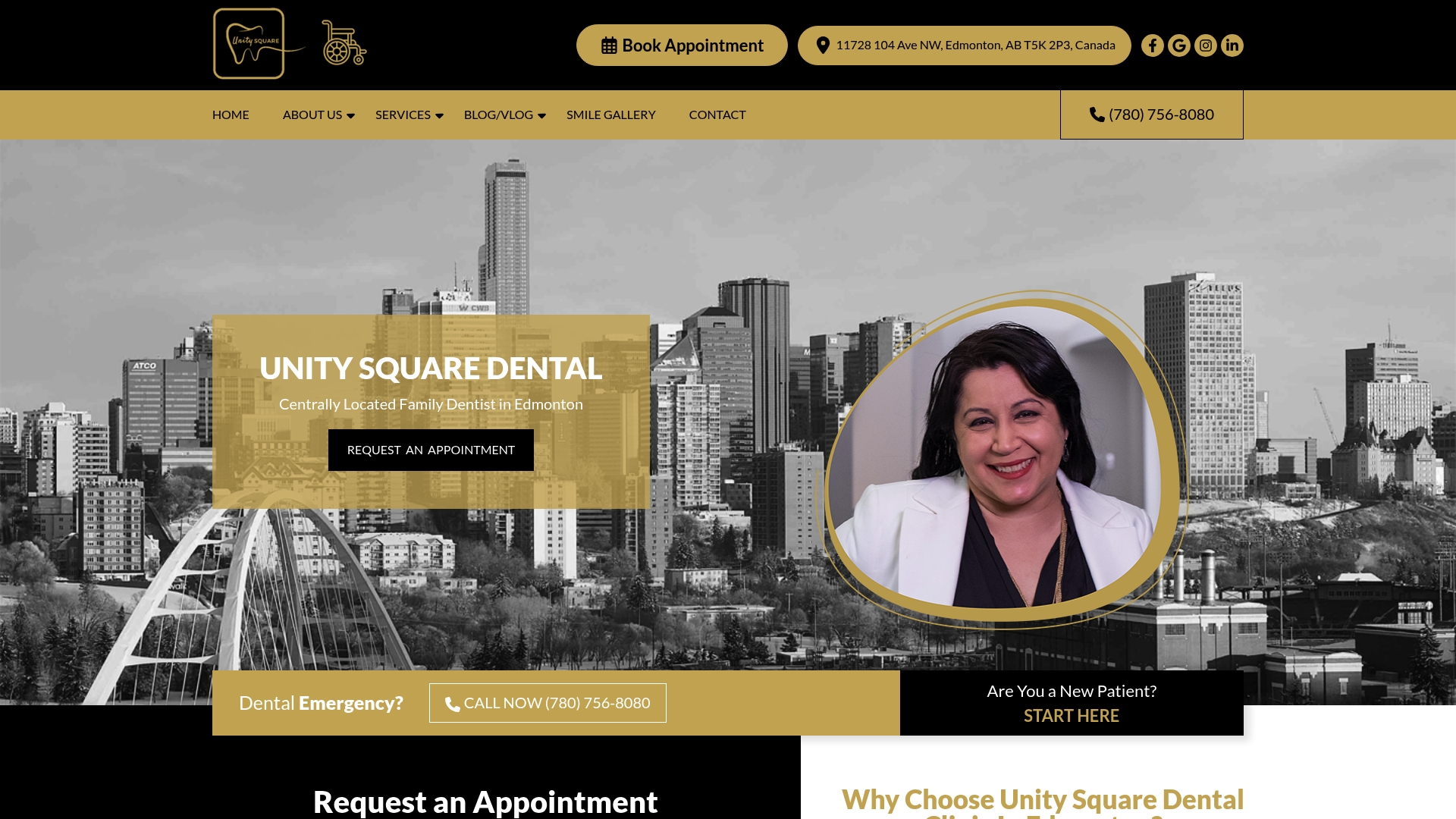
Did you know that about 1 in 5 people worldwide unconsciously grind their teeth at night or during the day? This silent habit, called bruxism, can cause more than just sore jaws. Left unaddressed, it leads to worn teeth, ongoing pain, and even trouble with sleep and daily focus. Gaining insight into why bruxism happens and how to manage it can play a big role in protecting your smile and overall well-being.
Key Takeaways
| Point | Details |
|---|---|
| Bruxism Prevalence | Affecting approximately 22% of the global population, bruxism often goes unnoticed despite its commonality. |
| Forms of Bruxism | It manifests primarily as sleep bruxism and awake bruxism, each driven by different triggers and displaying unique behaviors. |
| Health Consequences | Prolonged teeth grinding can lead to significant dental issues, jaw dysfunction, and adverse effects on overall health and sleep quality. |
| Management Strategies | A multifaceted approach combining professional dental solutions with lifestyle modifications is key to effectively managing bruxism. |
Table of Contents
- What Is Teeth Grinding (Bruxism)?
- Types and Causes of Bruxism
- Dental and Jaw Health Consequences
- Sleep and Overall Health Impacts
- Prevention and Management Strategies
What Is Teeth Grinding (Bruxism)?
Teeth grinding, clinically known as bruxism, is an unconscious oral behavior where individuals repetitively clench, grind, or stiffly move their jaw muscles. According to research, this condition affects approximately 22% of the global population, making it surprisingly common yet often overlooked.
Bruxism manifests in two primary forms: sleep bruxism and awake bruxism. Sleep bruxism occurs during nighttime and involves unconscious jaw movements, while awake bruxism happens during daytime and typically involves jaw clenching. As research from the MDPI journal indicates, for most healthy individuals, bruxism is considered a behavior rather than a medical disorder.
The symptoms of teeth grinding can be both subtle and significant. People experiencing bruxism might notice:
- Persistent jaw muscle aches
- Frequent morning headaches
- Increased tooth sensitivity
- Worn or damaged dental restorations
- Unexplained facial pain
While the exact causes can vary, stress, anxiety, misaligned teeth, and sleep disorders often contribute to this condition. Understanding bruxism is the first step toward managing its potential long-term impacts on your dental health.
Types and Causes of Bruxism
Bruxism isn’t a one-size-fits-all condition, but rather a complex oral behavior with distinct types and intricate underlying causes. According to research, bruxism primarily manifests in two primary forms: sleep bruxism and awake bruxism, each with unique characteristics and potential triggers.
Here’s a comparison of key differences between sleep bruxism and awake bruxism:
| Feature | Sleep Bruxism | Awake Bruxism |
|---|---|---|
| Timing | During sleep Unconscious |
During waking hours Usually conscious |
| Main Movement | Grinding Jaw shifting |
Clenching Rare grinding |
| Typical Triggers | Sleep disorders Medications |
Stress Anxiety |
| Population Affected | Adults Children |
Mostly adults |
| Detection | Family notice Dental exam |
Self-awareness |
Sleep bruxism, occurring during nighttime, involves unconscious jaw movements and muscle activities. According to research from sleep medicine studies, specific risk factors include male sex, antidepressant usage, sleep disruptions, and variations in sleep apnea indices. These findings highlight the multifaceted nature of nocturnal teeth grinding.
The causes of bruxism are equally nuanced, spanning multiple domains:
- Psychological Factors: Stress, anxiety, and emotional tension
- Neurological Mechanisms: Potential dopaminergic system dysfunctions
- Pharmacological Influences: Certain medications, especially antidepressants
- Sleep Disorders: Correlations with sleep apnea and irregular sleep patterns
While historical perspectives often attributed bruxism to bite misalignment, current scientific consensus suggests central nervous system regulation plays a more significant role. Understanding these complex interactions is crucial for effective management and potential treatment strategies.

Dental and Jaw Health Consequences
Continuous teeth grinding can wreak significant havoc on your dental and jaw health, triggering a cascade of potentially serious consequences. Research from clinical studies reveals that bruxism dramatically increases the risk of multiple dental complications, with statistical evidence showing exponentially higher chances of damage compared to individuals who do not grind their teeth.
The most notable dental impacts include tooth wear and structural damage. According to research, bruxism raises the odds of tooth wear by approximately 7 times, potentially leading to severe tooth attrition, fractures, and abfraction lesions. These microscopic damages can compromise tooth integrity, potentially requiring extensive dental interventions like crowns, veneers, or even tooth replacement.
Bruxism’s impact extends beyond teeth, significantly affecting jaw muscles and joints:
- Masseter Muscle Hypertrophy: 15 times higher likelihood of muscle enlargement
- Bone Structural Changes: 3 times increased chance of bone modifications at the mandibular angle
- Temporomandibular Joint Dysfunction (TMD): Approximately 17% global co-occurrence rate
Moreover, understanding why teeth hurt becomes crucial when examining bruxism’s long-term consequences. Persistent grinding can lead to chronic jaw pain, headaches, and potentially permanent alterations in jaw alignment and muscle function. Early recognition and professional intervention are key to preventing these progressive and potentially irreversible dental health challenges.
Sleep and Overall Health Impacts
Teeth grinding, particularly sleep bruxism, extends far beyond dental concerns, significantly impacting overall health and sleep quality. Research from clinical studies reveals that individuals experiencing sleep bruxism encounter substantially compromised sleep architecture, characterized by decreased sleep efficiency and increased sleep fragmentation.
The cardiovascular implications of sleep bruxism are particularly alarming. According to research published in medical journals, persistent teeth grinding triggers heightened sympathetic nervous system activity, potentially leading to multiple systemic health challenges. These include:
- Elevated heart rate variability
- Increased inflammatory processes
- Higher oxidative stress levels
- Potential endothelial remodeling
- Hormonal disturbances
Beyond physical health, sleep bruxism can dramatically affect mental well-being and daily functioning. The persistent muscle tension and disrupted sleep patterns can result in chronic fatigue, morning headaches, and reduced cognitive performance. Stress and dental health are intricately connected, making it crucial to address bruxism as more than just a dental issue, but as a comprehensive health concern that impacts multiple bodily systems.
Prevention and Management Strategies
Managing teeth grinding requires a multifaceted approach that combines professional dental interventions with lifestyle modifications. While completely eliminating bruxism can be challenging, several targeted strategies can significantly reduce its impact and frequency.
Primary prevention methods focus on physical protection and muscle relaxation. Dental protective devices like custom-fitted mouthguards or night splints serve as critical first-line defenses, creating a barrier that prevents direct tooth-to-tooth contact and reduces potential damage. These custom solutions are particularly effective for individuals experiencing sleep bruxism.
Lifestyle and stress management play equally crucial roles in bruxism prevention:
- Stress Reduction Techniques: Meditation, yoga, deep breathing exercises
- Dietary Modifications: Reducing caffeine and alcohol intake
- Muscle Relaxation: Applying heat therapy, gentle jaw massages
- Sleep Hygiene: Establishing consistent sleep routines
- Physical Exercise: Regular activity to reduce overall tension
For comprehensive management, understanding medications that affect teeth health becomes essential. Consulting with dental professionals can help identify potential pharmaceutical triggers and develop personalized strategies to mitigate bruxism’s long-term effects. Professional guidance ensures a holistic approach tailored to individual physiological and psychological factors.

Ready to Protect Your Smile from the Effects of Teeth Grinding?
Are you worried about the persistent jaw pain, worn teeth, or restless nights caused by bruxism? The solutions you read about in our complete guide are closer than you think. At Unity Square Dental, we understand how teeth grinding can affect your daily life and long-term health. Our clinic uses advanced dental technology and a highly personalized approach to help you prevent further damage and restore your comfort. If you are experiencing symptoms like morning headaches or sensitive teeth, it is important to act now and protect your smile before issues become permanent.

Book a consultation at Unity Square Dental today and discover our full range of services for bruxism, including protective mouthguards and expert guidance on stress management. For more details on how stress impacts your oral health, visit our in-depth page on stress and dental health in Edmonton. Learn about medications that affect teeth that could be linked to your teeth grinding problems. Your path to relief and a healthier smile starts right now—schedule your appointment with our trusted team and experience compassionate, effective care tailored to your needs.
Frequently Asked Questions
What are the primary causes of teeth grinding (bruxism)?
Teeth grinding can be caused by a variety of factors, including psychological factors like stress and anxiety, neurological mechanisms, certain medications (especially antidepressants), and sleep disorders such as sleep apnea.
What are the potential dental consequences of bruxism?
Bruxism can lead to significant dental issues, including tooth wear, fractures, and structural damage. It increases the risk of tooth attrition by approximately seven times, which may necessitate extensive dental treatments like crowns or veneers.
How does sleep bruxism affect overall health?
Sleep bruxism can disrupt sleep quality, leading to issues such as diminished sleep efficiency, chronic fatigue, and cognitive impairment. It is also associated with cardiovascular risks, including elevated heart rate variability and increased inflammation.
What are some effective prevention strategies for bruxism?
Effective prevention strategies include using custom dental protective devices like mouthguards, managing stress through techniques like yoga and meditation, improving sleep hygiene, and making dietary modifications to reduce caffeine and alcohol intake.
Recommended
- Stress and Dental Health: Essential Guide for Edmonton Families 2025 – Unity Square Dental
- Understanding Why Do Teeth Hurt: Key Insights Explained – Unity Square Dental
- Understanding Medications That Affect Teeth Health – Unity Square Dental
- How to Relieve Tooth Pain: Effective At-Home Solutions – Unity Square Dental
- Understanding Orthodontic Appliance Choice for Better Care – SyncSplint.com

